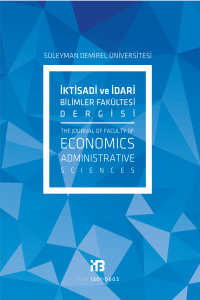GÜÇ GEÇİŞİ TEORİSİ BAĞLAMINDA KÜRESEL FİNANSAL KRİZİN JEOPOLİTİK ETKİLERİ
Küresel finansal kriz, birçok ülkeyi ve küresel ekonomiyi resesyona sürükledi. Bu resesyon, küresel olarak senkronize olduğu ve bir finansal krizin ardından geldiği için, kriz öncesi üretim seviyelerine tekrar ulaşmanın daha uzun süreceği tahmin edilmektedir. Bu, Gayri-Safi Milli Hasıla, Güç Geçişi Teorisi için ulusal gücün en önemli göstergesi olduğu için, Güç Geçişi Teorisi perspektifinden uluslararası politika için çok önemli bir gelişmedir. Bundan daha da önemlisi, küresel krizin baskın ülke, ABD ve meydan okuyan ülke, Çin üzerindeki asimetrik etkisidir. A.B.D. ekonomisi 2009 yılında yüzde 2,4 küçülmüş, Çin ekonomisi ise yüzde 8,7 büyümüştür. Bu makalede, krizin baskın ve meydan okuyan ülke ekonomileri üzerindeki asimetrik etkisinden dolayı, uluslararası sistemin başa baş olma evresine, krizden önce tahmin edilenden daha erken girebileceği savunulmaktadır.
Anahtar Kelimeler:
Uluslararası ilişkiler, Güç Geçişi Teorisi, uluslararası ekonomi, küresel finansal kriz
Geopolitical Impacts of The Global Financial Crisis Within Context of The Power Transition Theory
Keywords:
-,
___
- ALTMAN, Roger C. (2009), “The Great Crash, 2008: A Geopolitical Setback for the West”, Foreign Affairs, Vol. 88, No. 1, p. 2-15.
- BROOKS, Stephen G. and William C. Wohlforth (2009), “Reshaping the World Order”, Foreign Affairs, Vol. 88, No. 2, p. 49-64.
- CHIN, Gregory and Eric Helleiner (2009), “China as a Creditor: A Rising Financial Power?”, Journal of International Affairs, Vol. 62, No. 1, p. 87-102.
- COY, Peter, Stanley Reed and Jack Ewing (2008, October 20), “How to Stop the Panic”, Business Week, No. 4104, p. 28-29. 5. EICHENGREEN, Barry and Kevin H. O’Rourke (2009), “A Tale of Two 25.05.2009.
- http://voxeu.org/index.php?q=node/3421, 6.
- ENGELEN, Klaus C. (2008), “The Post-Subprime Regulation
- Scramble”, The International Economy, Vol. 22, No. 1, p. 62-69. 7.
- FERGUSON, Niall (2009), “The Axis of Upheaval”, Foreign Policy,
- No. 171, p. 56-59. 8.
- FORD, Peter (2009, March 30), “Ahead of G-20, China Questions
- U.S.’s Financial Dominance”, The Christian Science Monitor. 9.
- GAMBLE, Andrew (2010) “A New World Order? The Aftermath of
- the Financial Crisis”, Policy Insight, Vol. 1, No. 1, p. 17-19.
- GARRETT, Geoffrey (2010) “China, the United States and the World after the Global Financial Crisis”, Global Policy, Vol. 1, No.1, p. 29- 39.
- GREEN, William (2008, October 20), “Into the Dark”, Time, No. 172, p. 46-47.
- GROSS, Daniel (2010) “The Comeback Country: How America Pulled Itself Back From the Brink-and Why It's Destined to Stay on Top”, Newsweek, Vol.155,No.16, http://www.newsweek.com/id/236190, 20.04.2010.
- INTERNATIONAL MONETARY FUND (IMF) (2009a), World Economic Outlook April 2009: Crisis and Recovery, IMF, Washington.
- IMF (2009b), World Economic Outlook Update July 2009: An Update of the Key WEO Projections, IMF, Washington.
- IMF (2010a), World Economic Outlook April 2010: Rebalancing Growth, IMF, Washington.
- IMF (2010b), Global Financial Stability Report April 2010 Summary Version: Meeting New Challenges to Stability and Building a Safer System, IMF, Washington.
- JACQUES, Martin (2009, March 26), “No-one Rules the World”, New Statesman,http://www.newstatesman.com/north- america/2009/03/global-crisis-power-world, 15.05.2009.
- KUGLER, Jacek and Douglas Lemke (2000), “The Power Transition Research Program: Assessing Theoretical and Emprical Advances”, Manus I. Midlarsky (editor) Handbook of War Studies II, University of Michigan Press, Ann Arbor.
- KUGLER, Jacek and A.F.K. Organski (1989), “The Power Transition: A Retrospective and Prospective Evaluation”, Manus I. Midlarsky (editor), Handbook of War Studies, Unwin Hyman, Boston.
- KUGLER, Jacek and Ronald Tamen (2004), “Regional Challenge: China’s Rise to Power”, Jim Rolfe (editor), The Asia-Pacific: A Region in Transition, Asia- Pacific Center for Security Studies, Honolulu.
- MITCHELL, Tom (2009, April 19), “China Set to Invest Again in Europe”, Financial Times.
- MOORE, Malcolm (2009, April 16), “US Steps Back from Trade War with China”, The Telegraph.
- MOSES, Naim (2010) “It Didn’t Happen”, Foreign Policy, No. 177, p. 95-96.
- NATIONAL INTELLIGENCE COUNCIL (2008), Global Trends 2025: A Transformed World, National Intelligence Council, Washington.
- NEWSWEEK (2010) “The Shape of Things to Come :Four Leading Economists Predict the Trajectory of The Recovery”, Newsweek, Vol. 155, No.16, http://www.newsweek.com/id/236200, 21.04.2010.
- NYE, Joseph (2008), “American Power after the Financial Crisis”, Foresight Project, November 2008.
- ORGANSKI, A.F.K. (1958), World Politics, Alfred A. Knopf, New York.
- ORGANSKI, A.F.K. and Jacek Kugler (1981), The War Ledger, University of Chicago Press, Chicago.
- PEEL, Quentin (2009, April 5), “A Wider Order Comes into View”, Financial Times.
- REINHART, Carmen M. and Kenneth S. Rogoff (2009), “The Aftermath of Financial Crises”, American Economic Review, Vol. 99, No. 2, p. 466-72.
- REINHART, Carmen M. and Kenneth S. Rogoff (2009, March 30), “Don’t Buy the Chirpy Forecasts; The History of Banking Crises Indicates This One May Be Far From Over”, Newsweek, Vol. 153, No. 13.
- RODRIK, Dani (2009, 28 January), “Let Developing nations rule”, http://www.voxeu.org/index.php?q=node/2885, 04.05.2009.
- RODGERS, Walter (April 8, 2009), “America: A Superpower No More”, The Christian Science Monitor.
- SCALIGER, Charles (2009), “Parallels with the Great Depression”, The New American, Vol. 25, No. 4, p. 21-25.
- SETSER, Brad (2008), “A Neo-Westphalian International Financial System?”, Journal of International Affairs. Vol. 62, No. 1, p. 17-34.
- STIGLITZ, Joseph (2009, May 11), “Green Shots? Don’t Speak Too Soon”, The Guardian.
- TUCKER, Peter (2010), “Navigating the Multipolar World: The Free Market vs. State Capitalism” The Futurist, Vol. 44, No. 3, p. 29-31.
- WOLF, Martin (2009, April 21), “Why the “Green Shoots” of Recovery Could Yet Wither”, Financial Times.
- ZUCKERMAN, Mortimer B. (2008, October 27), “Avoiding a Deep Recession”, U.S. News&World Report, No. 145, p. 92-93.
- ISSN: 1301-0603
- Yayın Aralığı: Yılda 3 Sayı
- Başlangıç: 1996
- Yayıncı: Süleyman Demirel Üniversitesi
Sayıdaki Diğer Makaleler
GÜÇ GEÇİŞİ TEORİSİ BAĞLAMINDA KÜRESEL FİNANSAL KRİZİN JEOPOLİTİK ETKİLERİ
BELEDİYE HİZMETLERİNDE KALİTE: GİRESUN BELEDİYESİ ÖRNEĞİ
Yrd.doç.dr.resul USTA, Öğr.gör.levent MEMİŞ
AİLE İŞLETMELERİNDE NEPOTİZM ALGISI VE İŞ TATMİNİ İLİŞKİSİ ÜZERİNE BİR ARAŞTIRMA
Doç.Dr.Tuncer ASUNAKUTLU, Yrd.Doç.Dr.Umut AVCI
Yrd.doç.dr.özge AKKUŞ, Arş.gör.semra TÜRKAN, Prof.dr.hüseyin TATLIDİL
PORTFÖY BÜYÜKLÜĞÜNÜN PORTFÖY RİSKİ ÜZERİNE ETKİLERİ: İMKB-30 ÜZERİNDE TEST EDİLMESİ
Arş.gör.ömür TOSUN, Arş.gör.eda ORUÇ
Öğr.gör.ali Haydar GÜNGÖRMÜŞ, Yrd.doç.dr.ali UYAR
TÜRKİYE'DE İÇ GÖÇ HAREKETLERİNİN İSTİHDAM VE İŞGÜCÜ PİYASALARINA ETKİLERİ
